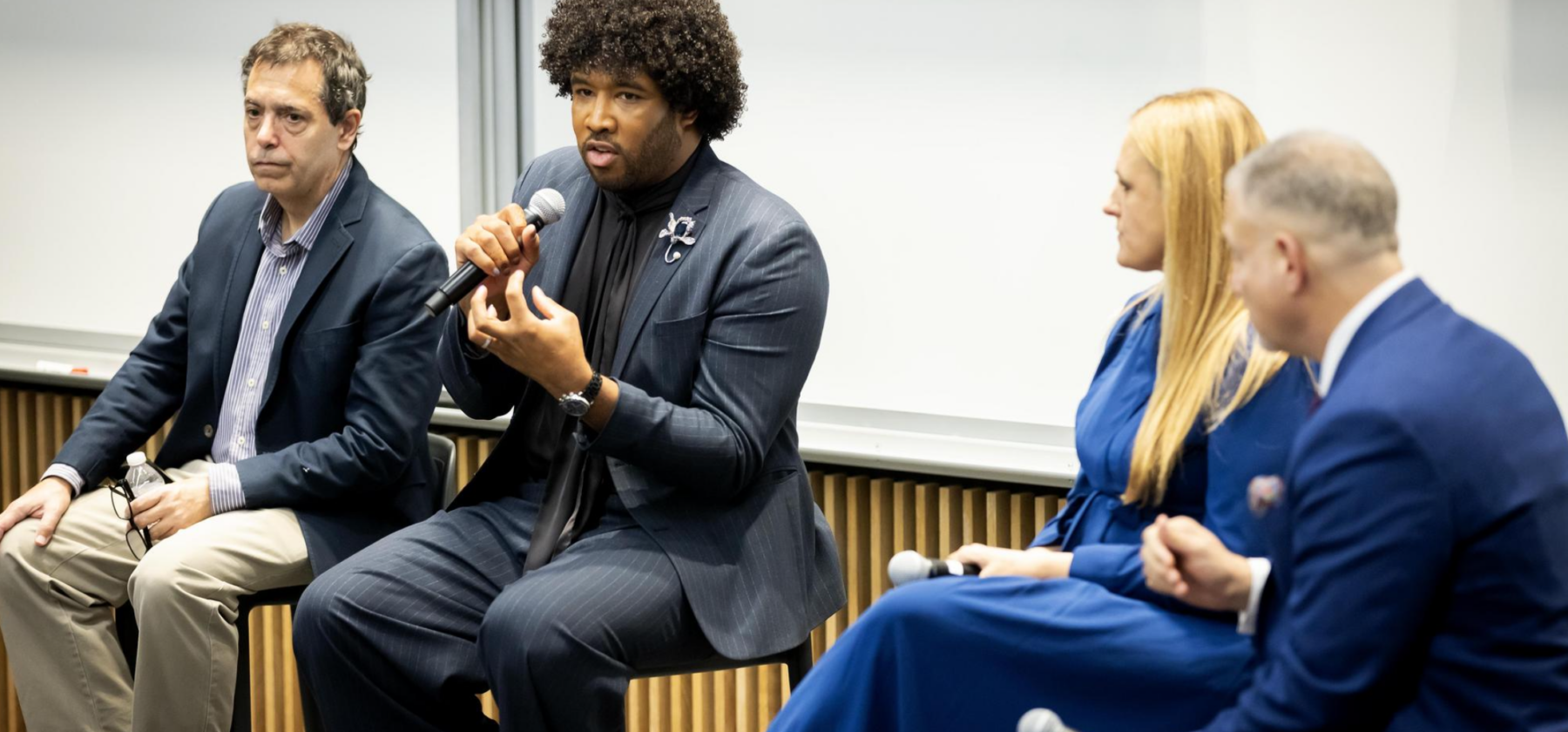Two weeks out from Election Day, the race for the presidency is neck-and-neck, with Pennsylvania at the center of a somewhat confounding political backdrop, according to a panel of national political journalists at a Red and Blue Exchange roundtable.
“The polls are so tight; in some ways, I’m surprised by how tight they are,” said Sarah McCammon, a national political correspondent for NPR and co-host of the NPR Politics Podcast. Eugene Daniels, White House correspondent for Politico said, “It is literally either of their race to win and will remain so until the end.”
McCammon and Daniels were among four journalists from a broad spectrum of outlets who shared their insights into “The State of the Campaign.” The event was the latest in an election series organized by the SNF Paideia Program, the Robert A. Fox Leadership Program/Penn Program on Opinion Research and Election Studies, the Red and Blue Exchange, and other campus collaborators.
The SNF Paideia Program creates and supports opportunities for the Penn community to learn about dialogue from dialogue and how to dialogue, engaging across social, cultural, and political differences. The Red and Blue Exchange is committed to expanding the range of ideological and partisan perspectives to which Penn students are exposed.
The reporters discussed possible indicators of victory, positive and negative signs for each candidate, and strategies being used in the field by the campaigns of Vice President Kamala Harris and former President Donald Trump.
David Drucker, senior writer for The Dispatch, said Trump has largely handed over standard get-out-the-vote efforts among traditional Republicans to allies and is largely trying to expand his base by energizing a cohort of “low-propensity” voters who have not often participated in recent elections. “If they could just get them to the polls, they are more likely than not to vote for Trump,” Drucker said. “And so he runs the same campaign he’s always ran.”
Greg Sargent, staff writer at The New Republic and host of “The Daily Blast” podcast, noted that, especially in Pennsylvania, the Harris campaign is determined to contest votes in rural areas that are traditionally conservative. Generally, Democrats run up their numbers in Philadelphia and Pittsburgh and the surrounding counties, but in this cycle they sound encouraged elsewhere in Pennsylvania, Sargent said.
“A big tell for me is how hard they’re contesting Erie County or the Erie area,” he said, noting that approach, paired with strong turnout from suburban women, may create winning conditions for Harris.
The Harris campaign is very aware of the records of the last two Democratic nominees against Trump, Daniels said. Pointing to the 2016 and 2020 elections, he said, “The only people who have proven they can beat Donald Trump is someone with a good ground game.” The Harris campaign has set up 50 offices in Pennsylvania with 400 staff members coordinating the door-knocking and voter turnout efforts, he said.
One critical element in this campaign is the gender gap, or “gender chasm,” said moderator Brian Rosenwald, Red and Blue Exchange director and Scholar in Residence of the College of Liberal and Professional Studies. He asked the journalists their thoughts on what’s driving that and what the impact will be at the polls.
Protecting reproductive rights is a major theme of Harris’ campaign, McCammon said. “Abortion is an issue that motivates the traditional Democratic Party base. Voters of color, younger voters, and women all show a higher priority on the abortion issue,” she said. “It’s a widening gap.”
Part of the gender dynamics revolves around how Trump speaks about women, Daniels said: “That has been part of his career” from the very first GOP debate in 2016. “That has continued; that hasn’t stopped.”
“Statesmanship, I think, may matter to more women than it does to more men,” Drucker said.
One factor that political observers don’t fully understand yet—and probably won’t until the exit polls come in—is the Latino vote and the role of religion, McCammon said. Though Latinos have historically been Catholic, they are increasingly joining evangelical churches and shifting toward the Republican Party. “As the Latino population in this country gets larger, gets more diverse, you have second-, third-, fourth-generation Latinos who are less tied to their great-grandparents’ country of origin, more immersed in the dominant American culture,” she said.
A critical part of understanding Trump’s appeal to younger men is his ubiquitous presence in American culture even before getting into politics, Daniels said. “You think about ‘The Apprentice,’ you think about him looking tough, telling people, ‘You’re fired,’” he said. “That was how a lot of people grew up with him.”
The journalists were introduced by Sigal Ben-Porath, faculty director of the SNF Paideia Program. The event was co-sponsored by the Gamba Family Red and Blue Exchange, an initiative of the SNF Paideia Program; the Penn Political Union; and Penn’s Andrea Mitchell Center for the Study of Democracy.

